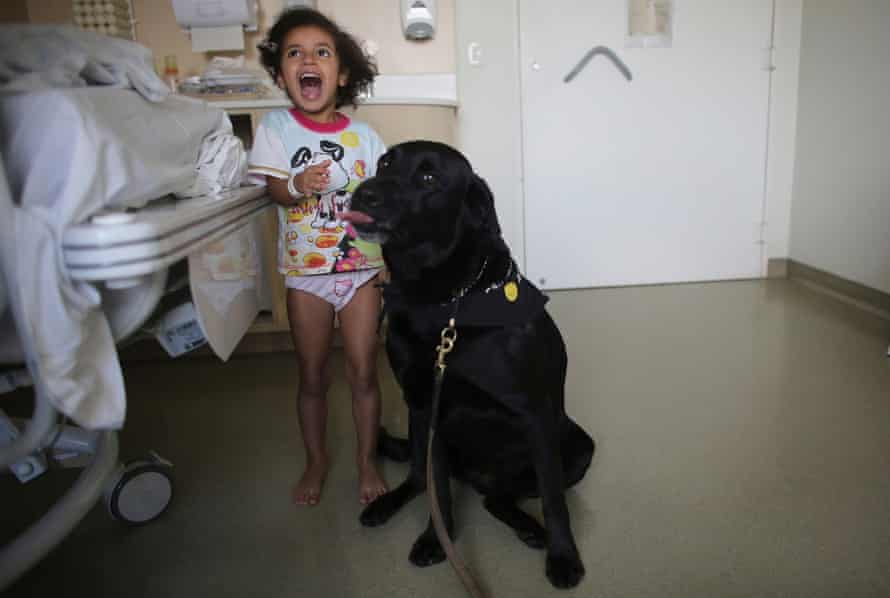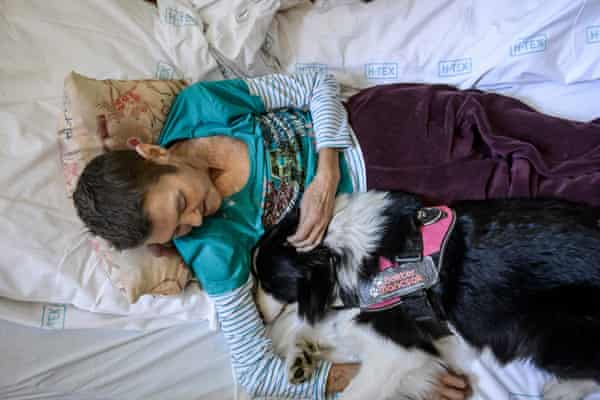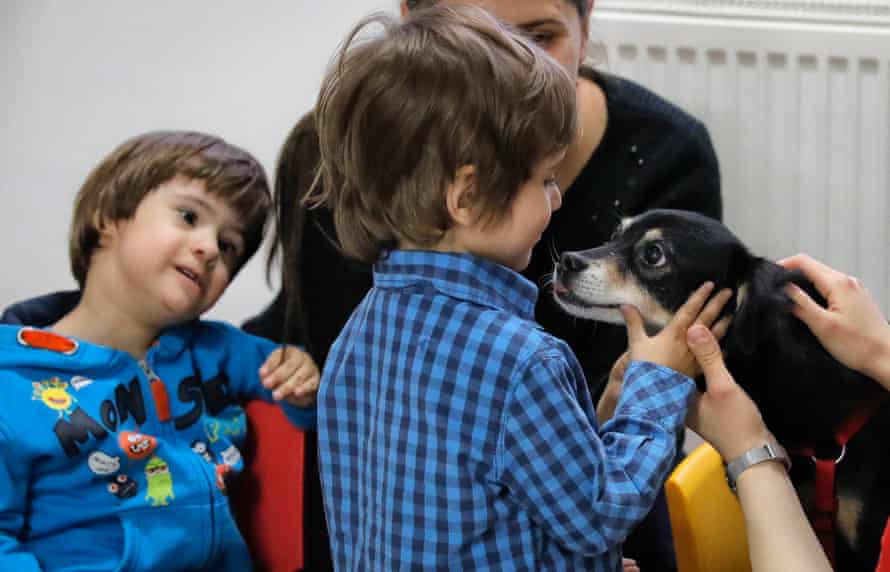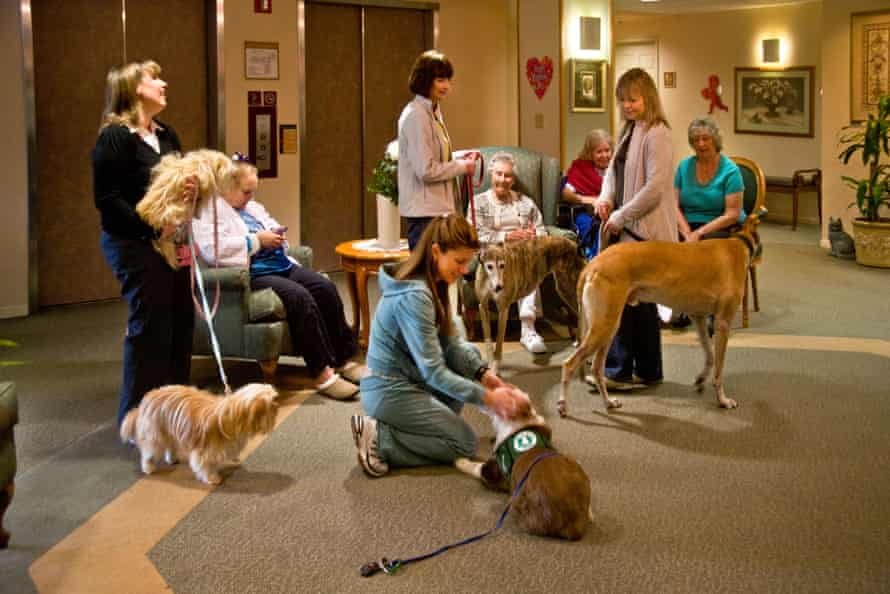How To Register Your Pet As An Emotional Support Pet
Due west hat is it about animals? Equally the bad news almost the coronavirus continues, "send me dogs and cats" has get a regular cry on social media, an easy-to-grasp shorthand for "I experience terrible, cheer me upwards". The response is always the same: a torrent of pictures of animals doing daft things – but somehow it has a magical, calming effect.
The therapeutic value of our human relationship with our pets, particularly dogs, is increasingly recognised by researchers. Cats tin be wonderful too – but dogs take been domesticated by humans for much longer, and, as fifty-fifty the most devoted cat lover will admit, dogs are far easier to train for companionship. Most cats, as we know, are beauteous for entirely different reasons. Marion Janner, a mental wellness campaigner and all-round animal lover, says that dogs teach us a whole range of lessons. "Dogs love us unconditionally. They're the ultimate in equal opportunities – entirely indifferent to race, gender, star sign, CV, clothes size or ability to throw absurd moves on the dance floor. The simplicity and depth of this love is a continuous joy, along with the health benefits of daily walks and the social delights of chats with other dog walkers. They teach kids to be responsible, donating and compassionate and, valuably but sadly, how to cope when someone you love dies."
Robert Doward* felt this odd outcome when his health of a sudden took a downward plow. "I'd been working incredibly hard, long hours, too many days. I day I started crying and just couldn't stop. I couldn't put sentences together properly. I'd been pushing everything so hard for so long, and I simply couldn't practice it any more than."
It took a long time to put himself back together: plus some therapy, another job and changes to his family life. But the key factor, he says only one-half-jokingly, was a small Greek rescue dog called Maria. "Taking her out for walks, getting out into fresh air, just putting one foot in front of the other, that lifts your spirits. And then there's goose egg like having a dog curled upwardly abreast you, fifty-fifty when yous experience admittedly miserable. She'll check my face anxiously, equally if she knows something is wrong. And that makes me smile – and that somehow makes you feel better. There is simply something magic about dogs. Honestly, she got me through."

Photograph: Nacho Doce/Reuters
Simply why? What is responsible for these therapeutic effects? Ane primal attribute appears to exist social recognition – the procedure of identifying another being as someone important and significant to you lot. The bond that forms between possessor and pet is, it seems, similar to the bond that a mother forms with her baby.
The importance of social recognition is increasingly acknowledged for the role it plays in helping us form networks. We now sympathise that salubrious social bonds tin play a central role in mental wellness; without them, we become lone, depressed and physically unwell. And pets, it seems, can fulfil that role. Academic and psychologist June McNicholas points out that pets can be a lifeline for socially isolated people.
"Pet care and self-care are linked. When yous take a dog out for a walk, people talk to yous and that may exist the only social contact an isolated person has the whole twenty-four hour period. If you lot have a cat, you can have a chat standing in the cat food aisle in the supermarket, deciding which brand to buy. When pet owners exit the house to buy pet food, they're more likely to buy nutrient for themselves and when they feed their pet, they'll sit down to consume too. People with disabilities often find that athletic people are socially awkward with them; if they have a domestic dog it breaks down barriers and allows a more comfortable and natural interaction."

Social recognition is something humans share with a few (though non all) mammals, including sheep and prairie voles. Nosotros are primed to expect after those we have made social bonds with; we don't breastfeed only any sometime baby and nosotros don't take random dogs habitation from the park. Author and researcher Million Daley Olmert explains "When we call our dog, 'our baby' it is because nosotros recognise it on a neural level every bit such. And this recognition triggers the same maternal bonding brain networks that allow a mother to expect at her red, slimy newborn and say, 'mine!'"
A small study of functional MRI brain scans in 18 women showed like responses in regions involved in reward, emotion and affiliation when the women looked at images of their child and pet dog.In that location were important differences though; dogs caused activeness in the fusiform gyrus (involved in facial recognition) and babies in the tegmentum (centres of reward and affiliation). We love our pets, but in a fire we're primed to relieve the baby.

Although scientists have some understanding of social recognition and where information technology takes place in the brain, nosotros still don't entirely understand how information technology happens. The missing link could exist oxytocin, the so-chosen "hug", "love" or "cuddle" hormone. Oxytocin has a central role in both childbirth, lactation and sperm motion, simply it also has an increasingly recognised function in our social behaviour, acting as a chemic messenger in pathways that control sexual arousal, recognition, trust, mother-infant and man-pet bonding.
Oxytocin works in tandem with another encephalon hormone, vasopressin, to help to attune our response to stress and deal with social situations. Unsurprisingly, there'due south a lot of interest in a possible role for oxytocin in habit, brain injury, anorexia, depression, autism and severe anxiety.
And in that location are other reasons that pets and therapy animals are increasingly recognised as being good for our mental health. In addition to helping to convalesce stress, anxiety, depression and loneliness, there are all the benefits that come from having to do a domestic dog. Daily walks outdoors boost physical and emotional wellbeing. Chucking sticks, picking upward balls – fifty-fifty scooping up dog poo – can provide an all-round workout.
Increasingly that knowledge is existence turned to practical employ, with some lovely effects. When the Centre for Mental Wellness ran an evaluation on therapy dogs in prisons, for case, the feedback was off the scale. "I don't know what it is, merely even when I am running around with [the dog] I simply experience ameliorate inside, calmer, more peaceful," said one prisoner. Another told the interviewer: "Dogs have a magic effect on you, you tin experience their honey and that just makes y'all feel improve within y'all."
The practiced feelings persist even after the dogs have left, the reviewers found, with one subject saying: "I just walk effectually for the residue of the twenty-four hours on cloud 9."

Photo: Marmaduke St John/Alamy
Some of the Great britain'south most dangerous and violent mental wellness patients are cared for in one of iv high-security psychiatric hospitals. Nearly are diagnosed with schizophrenia and stay an average of seven years. The Country hospital in S Lanarkshire, Scotland, is one of these facilities and runs an creature therapy centre which gives patients the chance to pet and care for a range of animals including chipmunks, rabbits, hens, geese, pygmy goats and pigs.
Staff say that creature therapy helps to develop trouble-solving skills, empathy, attention to the needs of others, a sense of responsibility and a way of channelling aggressive thoughts among individuals who accept proved hard to reach with conventional psychiatric drugs and talking therapies.
Only what if you don't have a pet? Is in that location any shortcut to reproducing the beneficial effects? One candidate is sildenafil (Viagra). Having sex causes an oxytocin surge in the encephalon and taking Viagra may reproduce that surge without the faff of mating. A more than practical idea might be an oxytocin spray or tablet.
But biologist Sue Carter says that translating naturally occurring oxytocin into a commercially available product is challenging. Oxytocin has unique chemic properties and can shift form, making it hard to work with and measure. Importantly, "the effects of oxytocin are context dependent, sexually dimorphic (unlike in men and women), and contradistinct by feel."
Honestly? Gazing into your canis familiaris'south eyes may produce a more reliable sense of wellbeing than any commercially bachelor synthetic product.
* Some names and details have been changed.
Source: https://www.theguardian.com/society/2020/mar/17/dogs-have-a-magic-effect-the-power-of-pets-on-our-mental-health
Posted by: sullivanyessund82.blogspot.com


0 Response to "How To Register Your Pet As An Emotional Support Pet"
Post a Comment